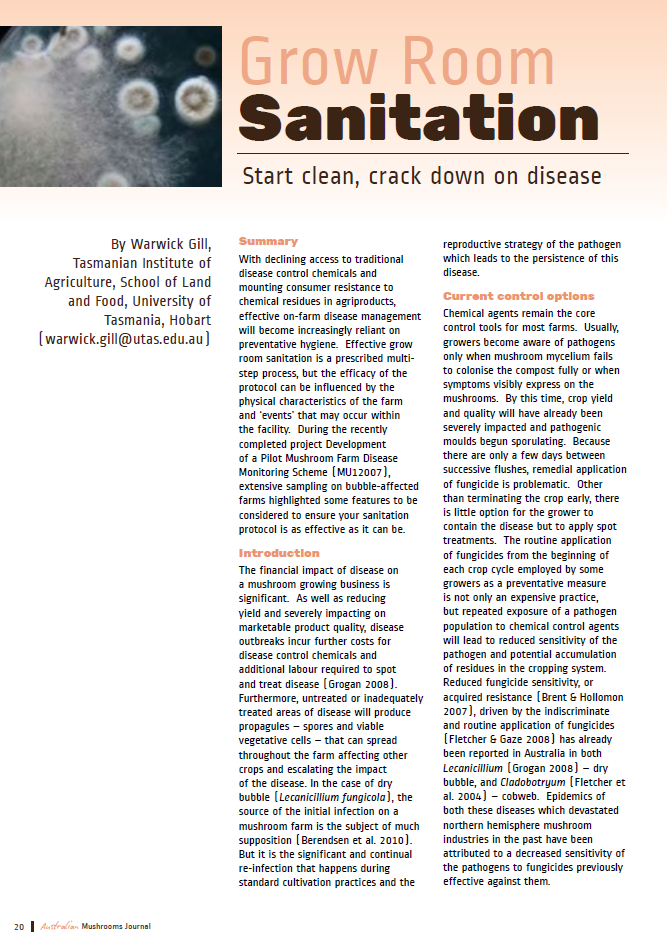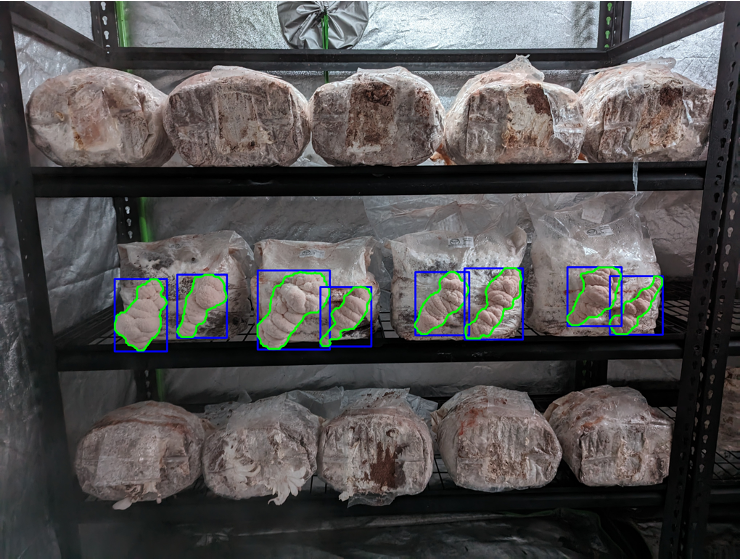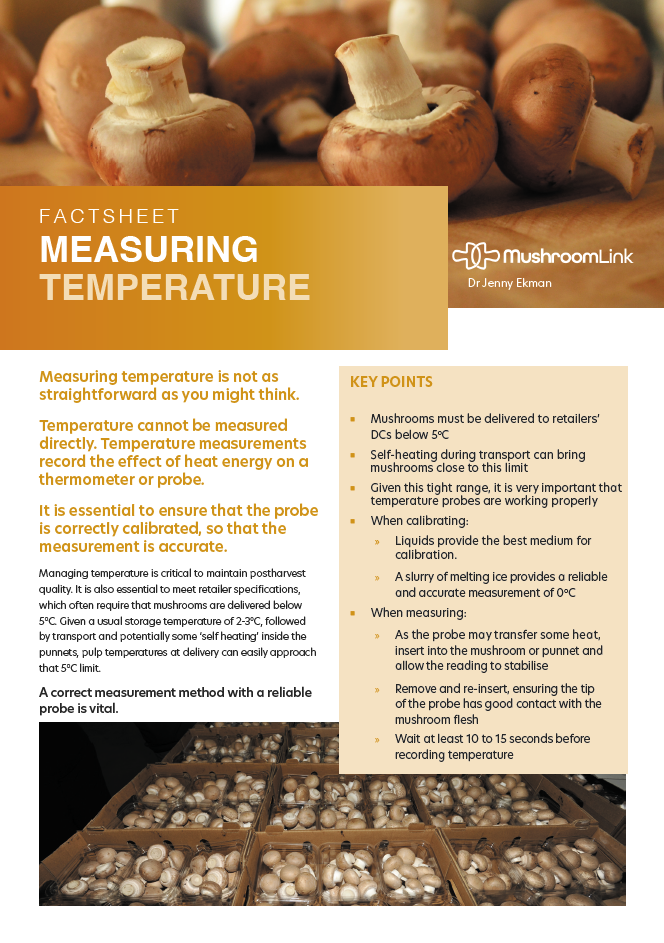MushroomLink Bulletin June 2024
In this edition:
Food safety month coming soon
Podcast: Dr Eoin O’Connor
Resource: Mushroom supply chain best practice guide coming soon
Webinar: Mushroom supply chain
Webinar: Hort Innovation Consumer Outlook Webinar
AMGA Conference Stronger Together, registrations now open
MushroomLink Magazine Issue 09
We hope you enjoy this issue, with its usual mix of R&D news, the latest in technology from around the world, and pest and disease updates.
You can subscribe to an e-copy of MushroomLink magazine here or view previous issues here
Click here to download the magazine
Articles
Levy funded project updates
A new Research, Development and Extension Coordinator to support the Australian mushroom industry
Protecting the Australian mushroom industry with Safe mushroom
Mushroom supply chain best practice guide
Marketing
Growing & Tech
Pest & Diseases
Special Feature - AMGA Conference Preview
Australian Mushroom Supply Chain Best Practice Guide
Consistent mushroom quality at retail is essential to keep consumers not just satisfied, but buying more mushrooms. The quality of the mushrooms that reach the retail display depends on many factors, including effective pre-harvest management, well managed harvesting and packing operations, fast cooling and accurate temperature control.
Drawing on the latest international research, as well as data collected in 2024 from Australian mushroom supply chains, this guide aims to summarise best practice for all those involved in growing, packing, transporting and retailing mushrooms. It includes guidelines on how the key factors affecting mushroom quality can be managed as well as actions needed to supply consistent, high-quality mushrooms the end-consumer.
This guide is suitable for all supply chain participants, from grower to retail. “If we can manage the supply chain properly, we reduce rejections at distribution centres, improve retail quality, minimise waste, and ensure food safety. That’s got to be another step towards a better mushroom industry for all” – Dr Jenny Ekman, Project Leader, MU22011.
From Farm to Frying pan: Best practice in mushroom supply chains
The best marketing in the world won’t sell mushrooms that are soft and bruised. Cold temperatures, careful handling and short timeframes are key to getting good quality mushrooms onto retail shelves.
However, questions remain. For example, why do mushrooms bruise so easily? What can we do to reduce bruising? How cold do mushrooms really need to be and what’s the most efficient way to keep them that way?
Join Dr Jenny Ekman and her team for the answers to these questions and more as they present the new Postharvest Best Practice guide for mushrooms.
Developed through the MU22011 Mushroom supply chain best management project, printed copies will be available to all industry members. Click here and fill in the request form to receive a copy of the guide. More than one copy can be requested.
Missed part one? You can watch the webinar recording here and learn about the results from the MU22011 project, including how far some mushrooms travel, temperature changes during transport, and how displays can impact shelf life.
Results from the mushroom supply chain best management project
Join the MushroomLink team as we speak with Dr Jenny Ekman from the MU22011 Mushroom supply chain best management project. In this two part webinar Jenny will discuss the results from this levy funded project.
Part 2 of the series will be presented on Wednesday 3 July where the postharvest best practice guide will be presented. Click here to find out more.
Eoin O'Connor and cutting edge mushroom disease research
In this podcast recorded at the 2024 ISMS congress, Dr Jenny Ekman chats to Eoin O'Connor, post-doctoral scholar at Penn State University, about his studies in Ireland, where he was inspired and mentored by Dr. David Fitzpatrick and Dr Helen Grogan, the latter of whom opened his world to mushroom science, and particularly virus X, and his current research in the Hockett lab.
MushroomLink Bulletin May 2024
In this edition:
Research feature article: Lignin removal
Webinars: Upcoming supply chain webinars
Resource: Mushroom supply chain best practice guide coming soon
MushroomLink at Hort Connections
AMGA conference advert
Nuffield scholarships closing soon
MushroomLink Bulletin April 2024
In this edition:
Feature article: Mushrooms in health care settings
Publication: Supporting mushrooms as a food-based solution to vitamin D deficiency in dietary guidelines
Marketing: New strategy to inform FY2025
NEW Podcast: Dr Mark Loftus from Sylvan Bioscience
Training: Mini series - mushroom farm hygiene
Webinars: Save the date for the mushroom supply chain webinars
AMGA Conference 2024
Dr Mark Loftus (Sylvan Spawn Company)
In this podcast Dr Jenny Ekman chats to Dr Mark Loftus from Sylvan Spawn company.
Mark’s career commenced in Manchester, UK, where he obtained a PhD and then completed a two-year post doc in human genetics.
So how did Mark go from human to mushroom geneticist? What is mushroom genetics anyway, and how can understanding mushroom genetics help strengthen the industry?
In this fascinating discussion, Mark explains the very hard work behind identifying mushroom markers, isolating genetically distinct strains (no kissing cousins here!) and the characteristics they are looking for in white and brown mushrooms.
MushroomLink Bulletin March 2024 - Magazine Autumn Issue
In this edition:
MushroomLink magazine: Autumn issue out now
Feature article: Cold mushrooms are quality mushrooms
Marketing: What’s planned in the coming months?
Podcasts: Revisit the MushroomLink podcast back catalogue
Fact sheet: Actions points to control Sciarid and Phorid flies
AMGA conference scholarship
Nuffield scholarships now open
MushroomLink Magazine Issue 08
We hope you enjoy this issue, with its usual mix of R&D news, the latest in technology from around the world, and pest and disease updates.
You can subscribe to an e-copy of MushroomLink magazine here or view previous issues here
Click here to download the magazine
Articles:
Levy-funded project updates:
Educating on the benefits of mushrooms in health care settings
Current Hort Innovation Mushroom Fund projects
Marketing:
Mushroom experiential product sampling goes to the beach
Main current contracted marketing project actuals at 2022/23 and 2023/24
Pests and diseases:
Growing & technology:
In each issue:
Grow Room Sanitation - Start clean, crack down on disease
With declining access to traditional disease control chemicals and mounting consumer resistance to chemical residues in agriproducts, effective on-farm disease management will become increasingly reliant on preventative hygiene. effective grow room sanitation is a prescribed multi- step process, but the efficacy of the protocol can be influenced by the physical characteristics of the farm and ‘events’ that may occur within the facility.
During the recently completed project Development of a pilot Mushroom farm Disease Monitoring Scheme (MU12007), extensive sampling on bubble-affected farms highlighted some features to be considered to ensure your sanitation protocol is as effective as it can be.
This article was originally produced for the Australia Mushrooms Journal
Containment strategies for dry bubble
Part of this work was carried out under the auspices of HIA Project MU12007
Put your foot down! Ensure your foot dips are safe to use and fit-for-purpose
One of the key aims of on-farm biosecurity and Integrated pest Management (IpM) programs is to prevent exposure of the crop to mushroom pathogens.
This is achieved through the implementation of three basic concepts: exclusion, containment and elimination.
Mushroom growers are at an advantage over most other horticultural crops as they are able to control pest movement in and out of growing rooms and one of the simplest tools used to exploit this advantage is the foot dip.
This article was originally produced for the Australian Mushrooms Journal
Action points to control sciarid and phorid flies
Sciarid and phorid flies can breed in bushland, ‘waste’ or ‘spent’ compost in the farm environment and, most efficiently of all, in growing rooms. The odour associated with the phase 3 compost arriving on a farm either in bulk or blocks acts like a strong magnet to attract flies to the new crop.
The fact that a female sciarid can produce around 100 offspring and a female phorid can produce around 50 offspring means that new crops need to be vigorously protected from invasion by adults and a holistic and integrated approach to fly control is required.
This article was originally produced for the Australian Mushrooms Journal
MushroomLink Bulletin February 2024 - FY25 Marketing strategy webinar recording
In this edition:
Launch of the 2022/23 Australian Horticulture Statistics Handbook
Webinar: Catch up on last week's webinar with Monique Emmi
Feature article: It’s not easy being green. New advances in Trichoderma research
Audio article: Phorid ecology and management
Dr Agaricus: What is foaming disease?
MushroomLink 2024 publication schedule
MushroomLink Bulletin January 2024 - Marketing webinar
In this edition:
Marketing webinar: REGISTRATIONS OPEN
New developments from the mushroom SIAP
Feature article: Growing mushrooms with AI assistance
Listen: NEW: Audio article - Chemical storage
NEW resource: Taking your mushrooms' temperature
Research from around the world: New biofilm that improves postharvest quality
ISMS conference with side symposium
Fact sheet: Measuring temperature
Measuring temperature is not so straightforward. By measuring temperature, you are actually measuring the effect of the energy within the mushrooms on another item – usually a metal temperature probe.
Managing temperature is not only essential to maintain postharvest quality, but also to meet retailer specifications. Mushrooms must be delivered below 5 Celsius. Given a usual storage temperature of 2-3 Celsius, followed by transport and potentially some ‘self-heating’ inside the punnets, they can be perilously close to this limit when delivered.
Measuring temperature sounds easy, but a number of things need to be considered, including calibrating your thermometer.
This fact sheet, prepared by Dr Jenny Ekman, describes the best ways to measure temperature in punnets of whole mushrooms and sliced mushrooms. Dr Ekman also provides insight into best practice calibration of temperature probes.
MushroomLink bulletin December 2023 - New Magazine!
In this edition:
New magazine: Our summer issue is here
Feature article: Best practice in mushroom supply chains
Marketing update: Webinars past and future
Podcast: Just dropped - Introducing the MUSHRoom
MushroomLink 2024 publication schedule
ISMS conference with side symposium
MushroomLink Magazine Issue 07
We hope you enjoy this issue, with its usual mix of R&D news, the latest in technology from around the world, and pest and disease updates.
You can subscribe to an e-copy of MushroomLink magazine here or view previous issues here
Click here to download the magazine
Articles:
































